Overview
Starting an event planning business can feel overwhelming, and you are not alone in facing these challenges. It involves several critical steps, such as:
- Conducting market research
- Defining your business structure
- Developing a comprehensive business plan
Understanding local demand and competition is essential, as it can significantly impact your journey. Have you thought about what makes your services unique? Creating a unique selling proposition can help differentiate you in this growing industry. Remember, taking these steps is not just about business; it’s about building a future that resonates with your aspirations.
Introduction
In the vibrant world of event planning, we understand that the journey from concept to execution can feel both exhilarating and daunting. As the demand for unique and engaging events continues to rise, aspiring planners often find themselves navigating a competitive landscape filled with both opportunities and challenges. Each step, from conducting market research to crafting a solid business plan, lays the groundwork for a successful venture, but it can be overwhelming.
This article delves into essential strategies for launching an event planning business, exploring how to identify niches, market effectively, and build invaluable connections within the industry. You are not alone in this journey; many have faced similar hurdles and emerged stronger. With insights from seasoned experts and a focus on current trends, we aim to empower you to turn your passion for planning into a thriving career. Let’s explore these strategies together and take the first step toward career ownership.
Laying the Groundwork: Essential Steps to Start Your Event Planning Business
- Conduct Market Research: Begin your journey by thoughtfully exploring the local occasion organization landscape. It’s important to identify potential rivals and their service offerings while also evaluating the demand for various types of occasions in your area. With 63% of meetings expected to be in-person in 2024, understanding local preferences is vital for tailoring your services effectively. Additionally, consider exploring funding options available from the U.S. Small Business Administration to support your startup costs and enhance your financial stability as you transition careers.
- Define Your Enterprise Structure: Choosing the right structure for your event planning business is crucial, whether it be a sole proprietorship, LLC, or corporation. Each option carries distinct legal and tax implications that can impact your operations and financial responsibilities. As you navigate these choices, remember that self-funding mechanisms through checking and savings accounts can provide a solid foundation for your venture. For instance, utilizing a high-yield savings account can help you accumulate funds for initial expenses while maintaining liquidity.
- Choose a Business Name: Selecting a memorable name that encapsulates your brand identity is key to establishing your presence. Ensure the name is unique by checking local registries to avoid any conflicts with existing entities. A strong, distinctive name can resonate with your community and foster a sense of trust.
- Register Your Venture: Completing the necessary paperwork to legally establish your enterprise with local and state authorities is an empowering step. This process may involve obtaining a license and a tax identification number, essential for operating legally and managing taxes. Understanding the legal framework will empower you to take control of your destiny in this new venture.
- Set Up Your Workspace: Decide whether you will operate from home or rent office space. Regardless of your choice, ensure you have the necessary tools and technology to manage your business efficiently. As the industry for organizing occasions continues to expand, with 72% of sponsors indicating a positive ROI from sponsorships, maintaining a well-structured workspace will enhance your productivity and client service.
By adhering to these fundamental steps, you can position yourself for success in the dynamic event planning business, which is anticipated to experience considerable growth in 2025. Parnell Woodard, a Career Ownership Coach, emphasizes the importance of taking control of your career path, stating, “Transitioning to planning for occasions can be a fulfilling journey for those seeking new opportunities.” Stay informed about current trends, such as the growing focus on sustainability, which 62.7% of participants noted at their most recent gatherings, to further differentiate your services and appeal to a wider audience.
Moreover, understanding attendee involvement is essential; 55% of Americans feel more connected through gatherings, yet 67.7% of marketers find it challenging to maintain attendee engagement during virtual sessions. By incorporating effective engagement strategies and focusing on your transferable skills, you can create a thriving business and enhance your community involvement. Furthermore, recognizing the challenges of employability in a declining job market and leveraging your transferable skills can be pivotal in establishing your new career path.
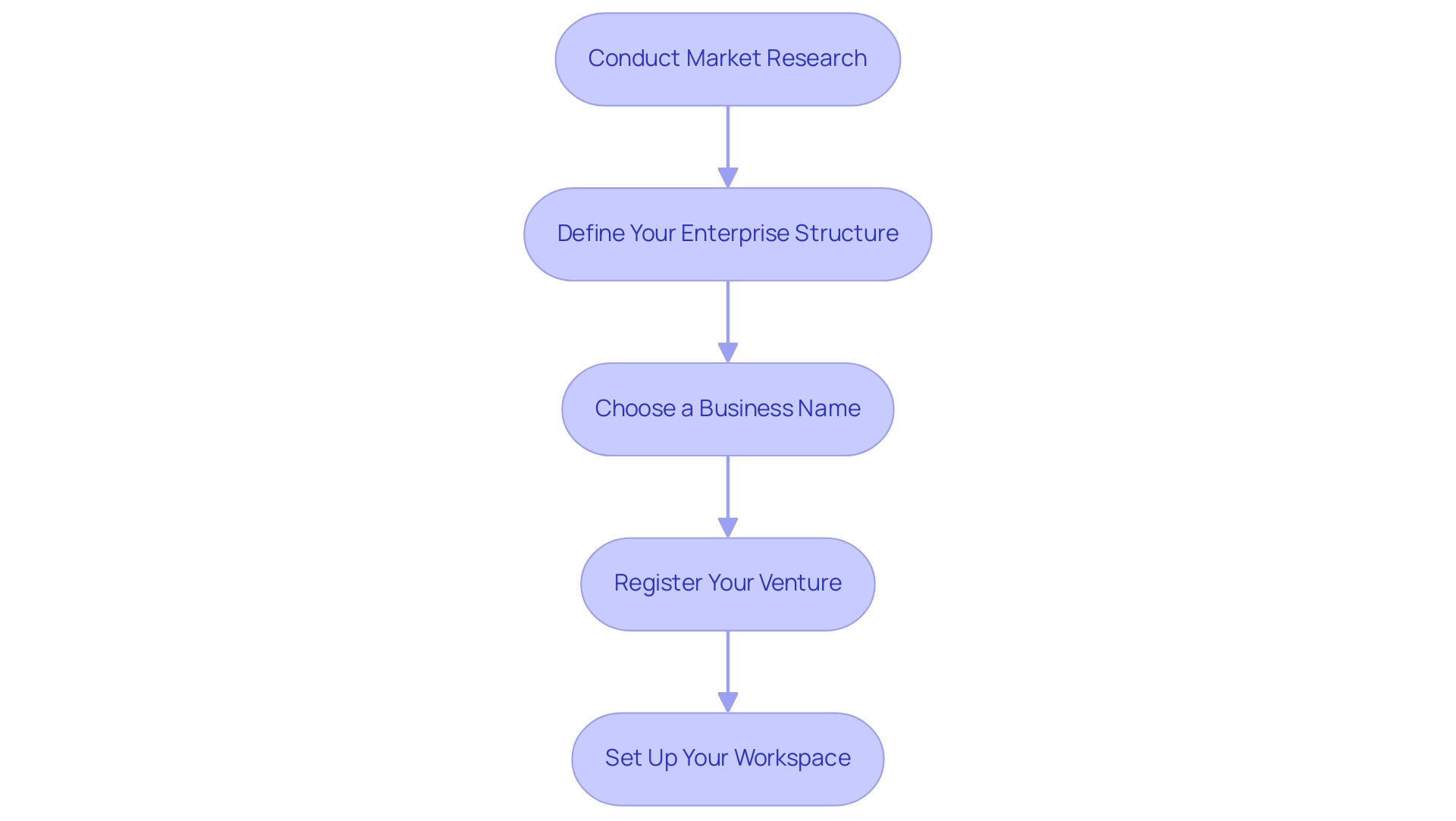
Finding Your Niche: Specializing in Event Planning
- Assess Your Interests and Skills: Take a moment to reflect on the occasions that truly excite you—whether they be weddings, corporate gatherings, or social parties. Understanding your strengths is not just beneficial; it’s essential. Consider which aspects of organizing activities you excel at, such as organization, creativity, or communication. This self-assessment will serve as a solid foundation for your future success in the industry, empowering you to take control of your career, especially in a job market that is constantly evolving and where traditional paths may feel less secure.
- Research Market Demand: Dive into the current landscape of planning in your area to uncover underserved niches. Pay attention to emerging trends, such as the growing emphasis on sustainability, which 62.7% of participants noted at recent gatherings. Additionally, with 60% of organizers identifying apps as essential, these tools can significantly enhance attendee engagement and streamline networking. Engage with local communities or conduct surveys to understand interest in specific types of activities, ensuring your offerings not only meet market needs but also reflect your transferable skills.
- Define Your Target Audience: It’s crucial to clearly identify your ideal customers by considering their demographics, preferences, and the types of gatherings they typically host. Understanding your audience will empower you to tailor your services effectively, enhancing your appeal in a competitive market while fostering community engagement. Building connections within your community can provide invaluable support and resources during your career transition.
- Create a Unique Selling Proposition (USP): Craft a compelling statement that highlights what distinguishes your services from competitors in your chosen niche. This could be your personalized approach, specialized expertise, or innovative solutions for various occasions. A powerful USP will not only attract clients but also help establish your brand identity in the event planning landscape. As Parnell Woodard, a Career Ownership Coach, emphasizes, transitioning to career ownership can empower you to achieve your career goals. The Entrepreneur’s Source offers no-cost coaching services and a structured process to support you on this journey. Furthermore, consider the increasing importance of online gatherings, as statistics show that 40% to 50% of registrants participate in webinars, with higher-performing webinars achieving up to 90% attendance. This insight can guide your organizational strategies in the digital age, helping you navigate the challenges of a declining job market while pursuing financial independence and the wealth-building opportunities it can bring.
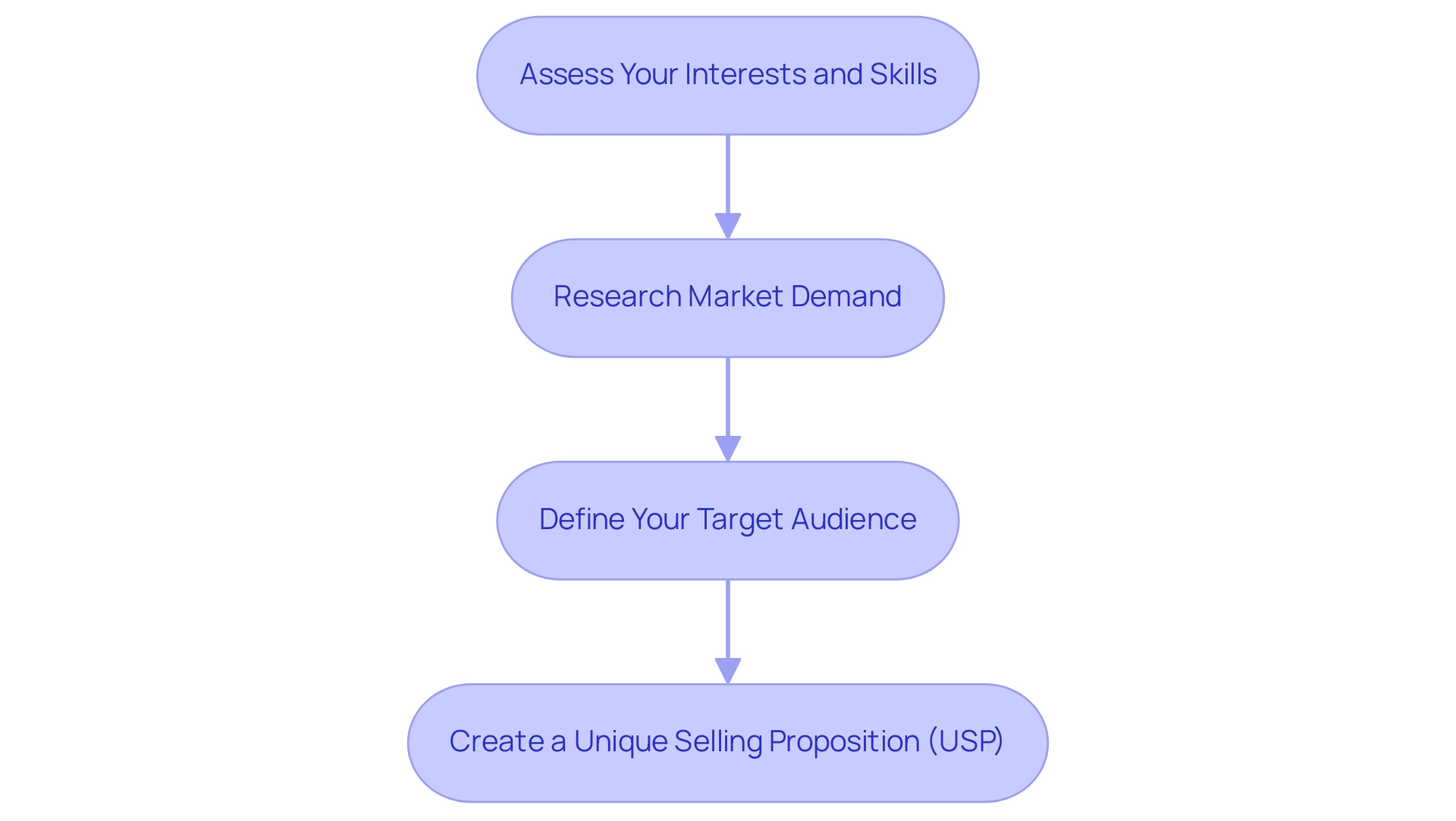
Crafting Your Business Plan: A Blueprint for Success
- Executive Summary: We understand that starting a new venture can be daunting. In this section, we outline our organization’s mission statement, the diverse services we offer, and the specific audience we aim to support. The Entrepreneur’s Source stands out by providing tailored coaching and assistance for those stepping into the event planning industry. This commitment sets the tone for our business plan, emphasizing our dedication to helping you achieve your career aspirations.
- Market Analysis: The planning industry is evolving, and we recognize the challenges you may face. Our thorough market research reveals insights into competitor strategies, emerging trends, and the growing demand for immersive experiences. Notably, 67% of professionals expect their budgets to increase in 2024, showcasing the industry’s potential. However, we also acknowledge the emotional toll of virtual fatigue; 84% of attendees report feeling burnout from larger online gatherings. This understanding informs our service offerings, ensuring we meet your needs.
- Marketing Strategy: How will you attract and retain clients? A robust marketing strategy is essential, encompassing branding initiatives, advertising channels, and promotional tactics tailored to your audience. We emphasize the importance of a comprehensive checklist for organizing events, addressing common challenges in the sector to ensure successful implementation and increased participation.
- Financial Projections: It’s crucial to have a clear financial outlook. We provide estimated startup costs, revenue forecasts, and a break-even analysis to guide your journey. The industry’s increasing power, driven by new technologies and trends, offers context for when your enterprise may become profitable, aiding your financial decision-making.
- Operational Plan: Daily activities in your event planning business are vital to your success. This includes staffing needs, supplier connections, and logistical factors essential for smooth execution. A well-organized operational strategy is key to managing the intricacies of planning and ensuring customer satisfaction. We also highlight the importance of personalized experiences to combat Zoom fatigue, as 84% of attendees have felt burnout from larger virtual events. Remember, you are not alone in this journey.
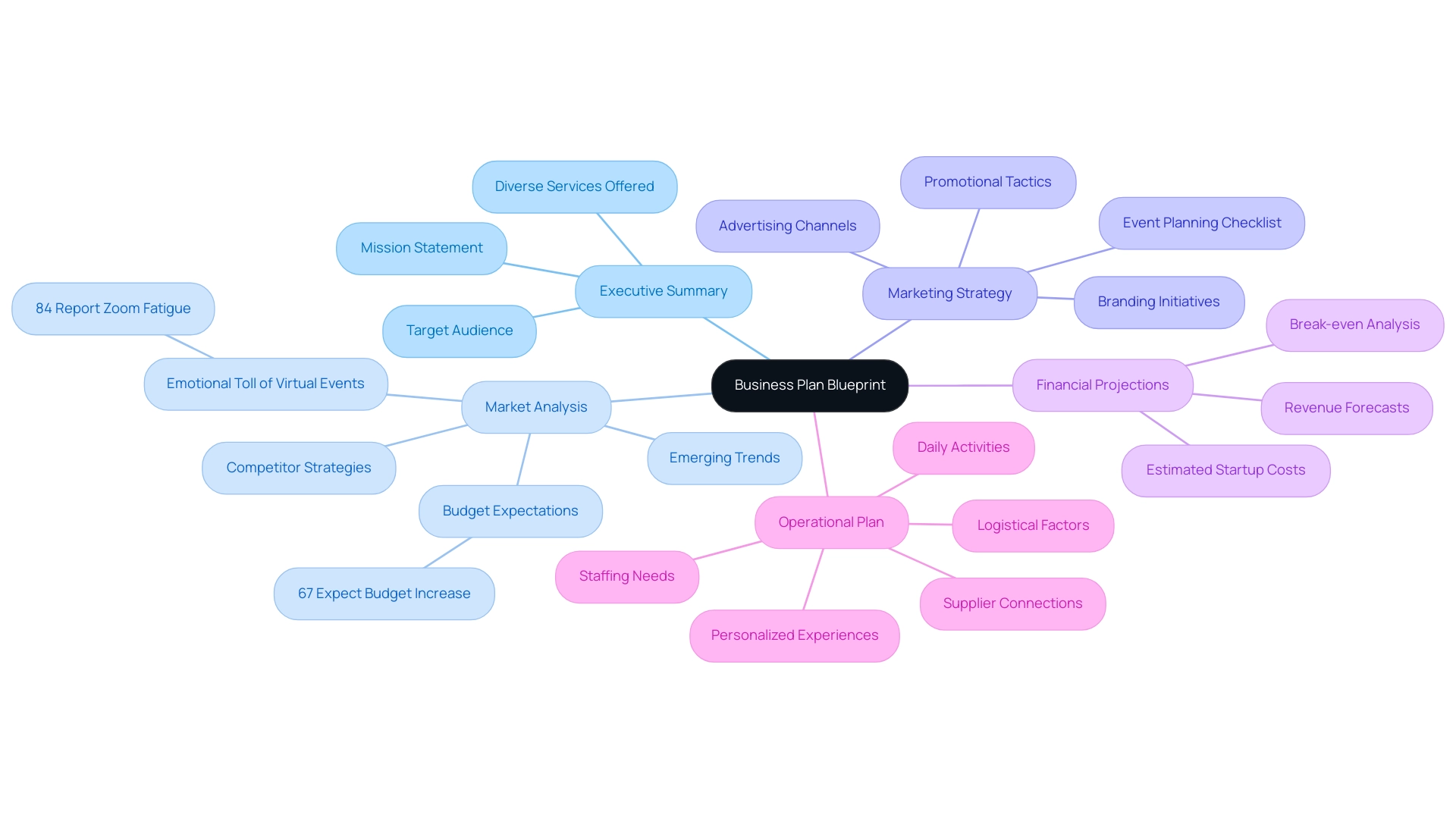
Marketing Your Event Planning Business: Strategies for Success
- Build a Professional Website: We understand that establishing a user-friendly website can feel daunting, yet it’s crucial for showcasing your services, portfolio, and customer testimonials. In 2025, a professional website is not just an option; it’s your first point of contact for potential customers. By ensuring your site is optimized for search engines (SEO), you can enhance visibility, knowing that studies reveal 75% of users never scroll past the first page of search results. Remember, a well-designed website can significantly boost inquiries and bookings, paving the way for your success.
- Employ Social Media: You are not alone in navigating the influence of social media platforms like Instagram, Facebook, and LinkedIn. These tools can help you showcase your work, interact with prospective customers, and advertise upcoming gatherings. In 2025, social media marketing is more vital than ever, with 80% of marketers noting an increase in website traffic due to these platforms. Share captivating material, including behind-the-scenes insights and client success stories, to cultivate a loyal audience who feels connected to your journey.
- Network with Industry Professionals: Engaging in sector gatherings and joining local commerce groups can feel overwhelming, but building relationships with vendors can lead to valuable referrals. Networking is essential, as approximately 89% of businesses in the event planning industry consider events crucial for achieving key business objectives. By nurturing a strong network, you open doors to collaboration and new opportunities. As Parnell Woodard, a Career Ownership Coach, emphasizes, transitioning to career ownership can empower you to achieve your goals, making networking a vital strategy in this journey.
- Offer Promotions and Packages: Creating appealing packages or discounts for first-time customers can feel like a powerful way to encourage bookings and generate word-of-mouth referrals. In a competitive market, these promotional offers help establish your brand and attract new customers. With inflation affecting over 65% of organizers, offering value through promotions can help you stand out, reassuring your clients that you understand their challenges.
- Collect and Showcase Testimonials: After each event, consider seeking feedback from participants and requesting permission to feature their testimonials in your marketing materials. Positive testimonials not only enhance your credibility but also serve as compelling social proof, influencing potential customers’ decisions. By emphasizing customer satisfaction, you can greatly influence your company’s reputation and growth. Remember, gatherings are central to driving sales and nurturing client relationships in the event planning business, reinforcing the importance of showcasing your successes.
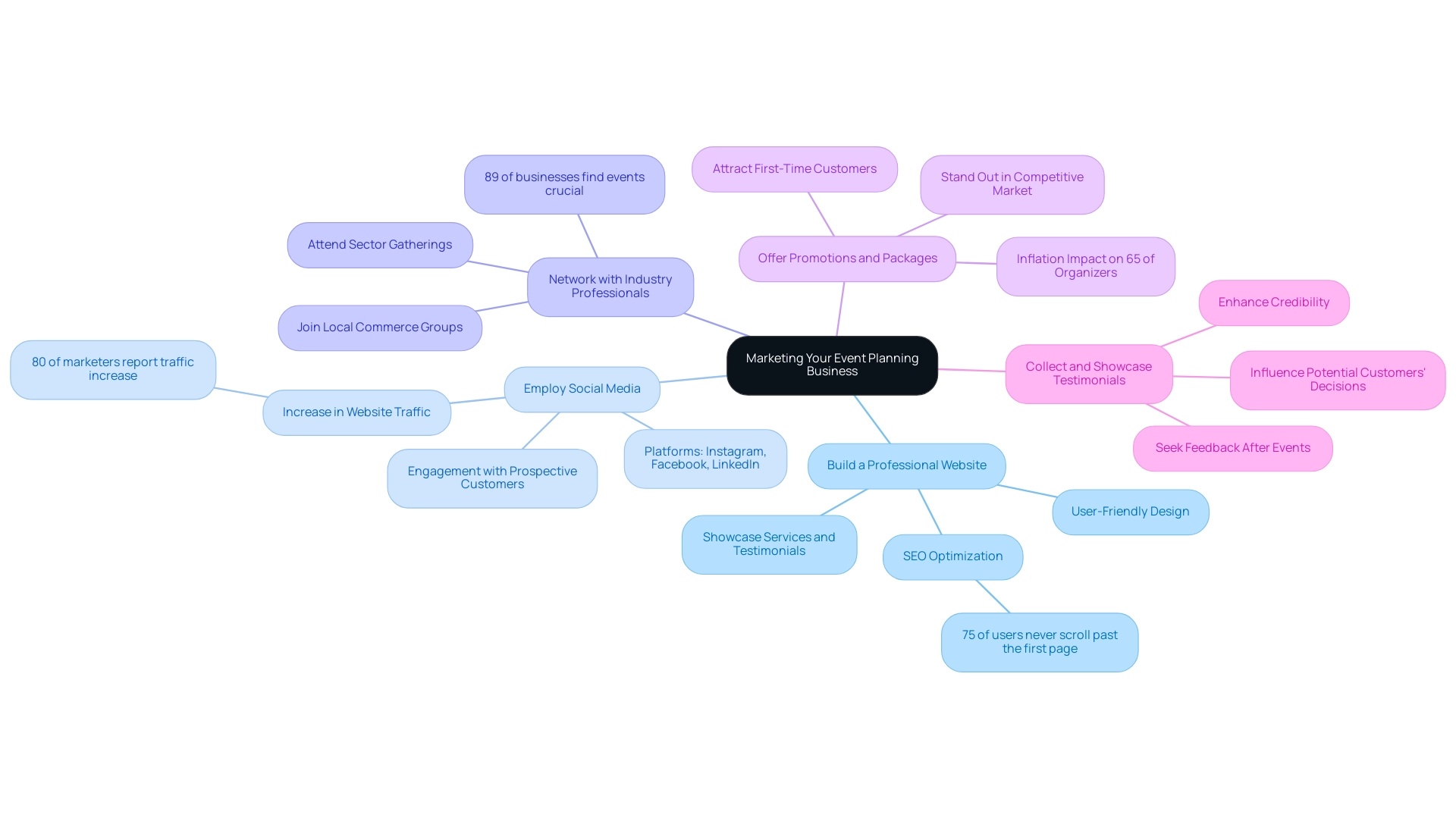
Financial Foundations: Budgeting and Pricing for Your Event Planning Business
- Determine Your Startup Costs: We understand that launching your event planning business can feel overwhelming. Begin by compiling a comprehensive list of all initial expenses, including essential equipment, marketing efforts, and legal fees. Recognizing these financial needs is crucial for laying a solid foundation.
- Create a Budget: Developing a detailed budget can be a comforting step in your journey. Outline your anticipated income and expenses for the first year, and consider including a contingency fund to cover unexpected costs. This preparation can help alleviate anxiety about financial surprises that may arise.
- Set Your Pricing Structure: Researching industry standards is an empowering way to establish a competitive pricing model for your services. Explore various pricing strategies, such as hourly rates, flat fees, or percentage-based pricing correlating with the overall budget. For instance, freelance organizers often charge below $10,000 for small-scale projects, while large virtual conferences can cost $1,000–$1,500 per attendee. Aligning your pricing with market expectations can provide you with confidence in your offerings.
- Track Your Finances: Implementing accounting software can be a reassuring practice to effectively monitor your income and expenses. This not only helps you stay within budget but also enables informed financial decisions as your business grows.
- Review and Adjust: Regularly assessing your financial performance can be a proactive approach to maintaining profitability. Be prepared to adjust your pricing or budget as necessary. Participating in industry gatherings and conferences can lead to a 20% growth in your client base, emphasizing the importance of networking and ongoing education in the organization sector. We suggest budgeting $5,000 to $10,000 each year for networking and industry gatherings.
Furthermore, consider tactics to reduce organizing costs, such as shortening the guest list, hosting morning functions, and negotiating prices. With 55% of Americans feeling more connected through gatherings, investing in these opportunities can yield substantial returns. By implementing these strategies, you can navigate the complexities of budgeting and set your event planning business on a path to success. Remember, you are not alone in this journey.
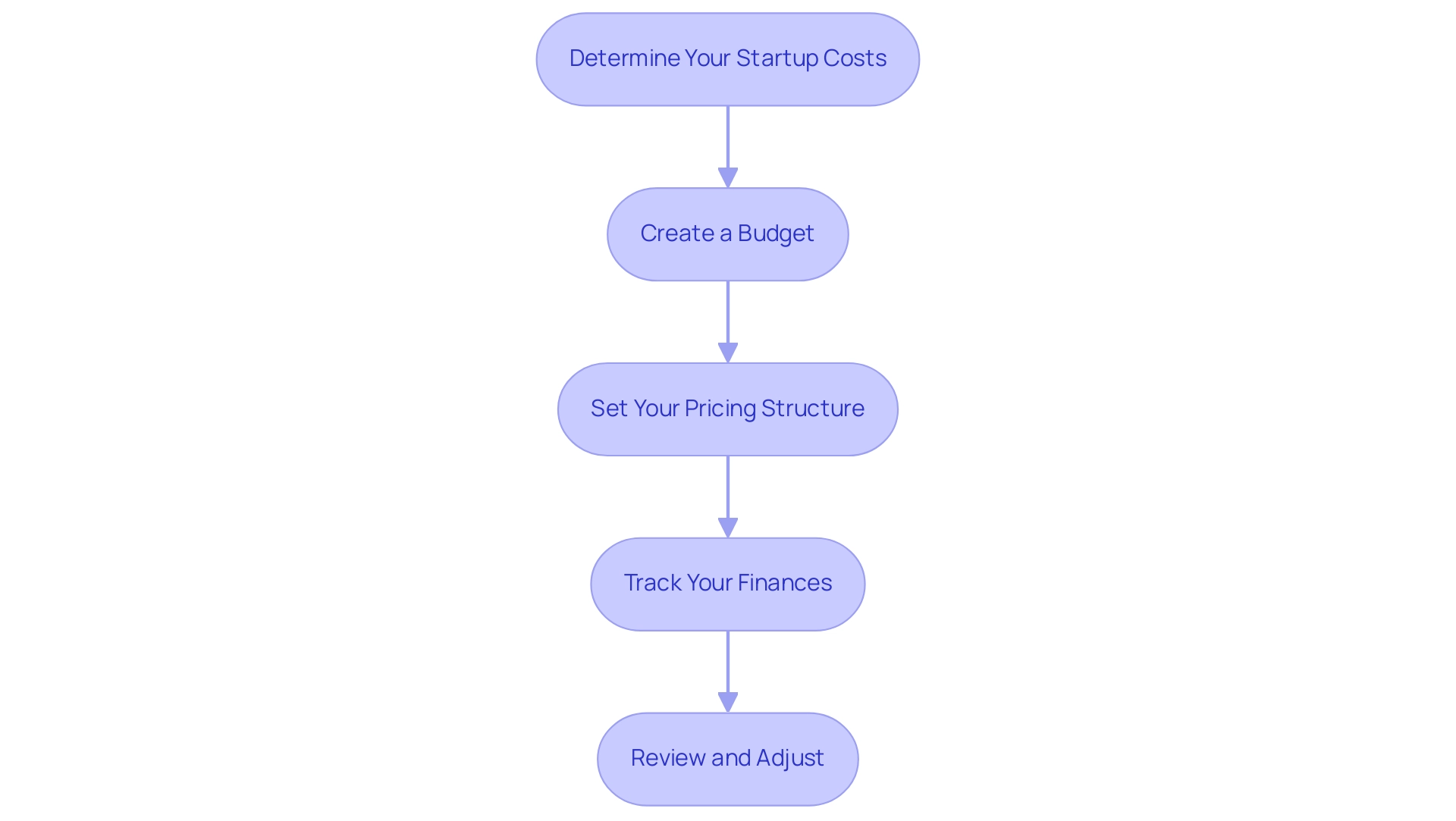
Building Connections: Networking in the Event Planning Industry
- Attend Industry Gatherings: Participating in conferences, trade shows, and local networking functions is not just beneficial; it’s essential for planners. These gatherings provide a unique opportunity to meet fellow professionals while connecting with potential clients. As we look towards 2025, the organization sector is anticipated to see a significant rise in participation, making these events crucial for establishing your presence in the industry. While companies invest over $15 billion annually on trade shows, many struggle to achieve measurable ROI due to inadequate follow-up strategies. Remember, implementing effective follow-up practices after these events is vital to your success.
- Join Professional Associations: Becoming a member of reputable planning organizations can truly be a game-changer for your career. These associations offer invaluable resources, training programs, and networking opportunities that can enhance your skills and expand your professional network. You are not alone—statistics show that planners who are members of professional associations report higher levels of satisfaction and success in their careers. Moreover, 52% of planners identify increasing attendance as a significant challenge, underscoring the importance of strong networking connections.
- Leverage Social Media: Utilize platforms like LinkedIn to forge meaningful connections with industry peers. Sharing insights, engaging in discussions, and showcasing your expertise can dramatically enhance your visibility. As we move into 2025, social media will continue to play a pivotal role in networking, with many professionals recognizing it as a key resource for establishing connections in the event coordination field.
- Follow Up: After meeting new contacts, don’t forget to send a follow-up email or message. Expressing appreciation and continuing the conversation can solidify these new relationships. This practice is especially crucial in the organizing industry, where personal connections often lead to referrals and collaborative opportunities.
- Collaborate with Other Vendors: Building relationships with caterers, photographers, and venues can foster mutually beneficial partnerships. These collaborations not only enhance your service offerings but also expand your network. As the landscape of organizing activities evolves, these partnerships are increasingly recognized as vital for delivering thorough and successful events. Additionally, being aware of the shifting priorities of attendees, such as sustainability and DEI, can help you tailor your services to meet client needs effectively. A systematic approach to organizing events, including setting clear goals and creating a budget, is essential for anyone starting their event planning business.
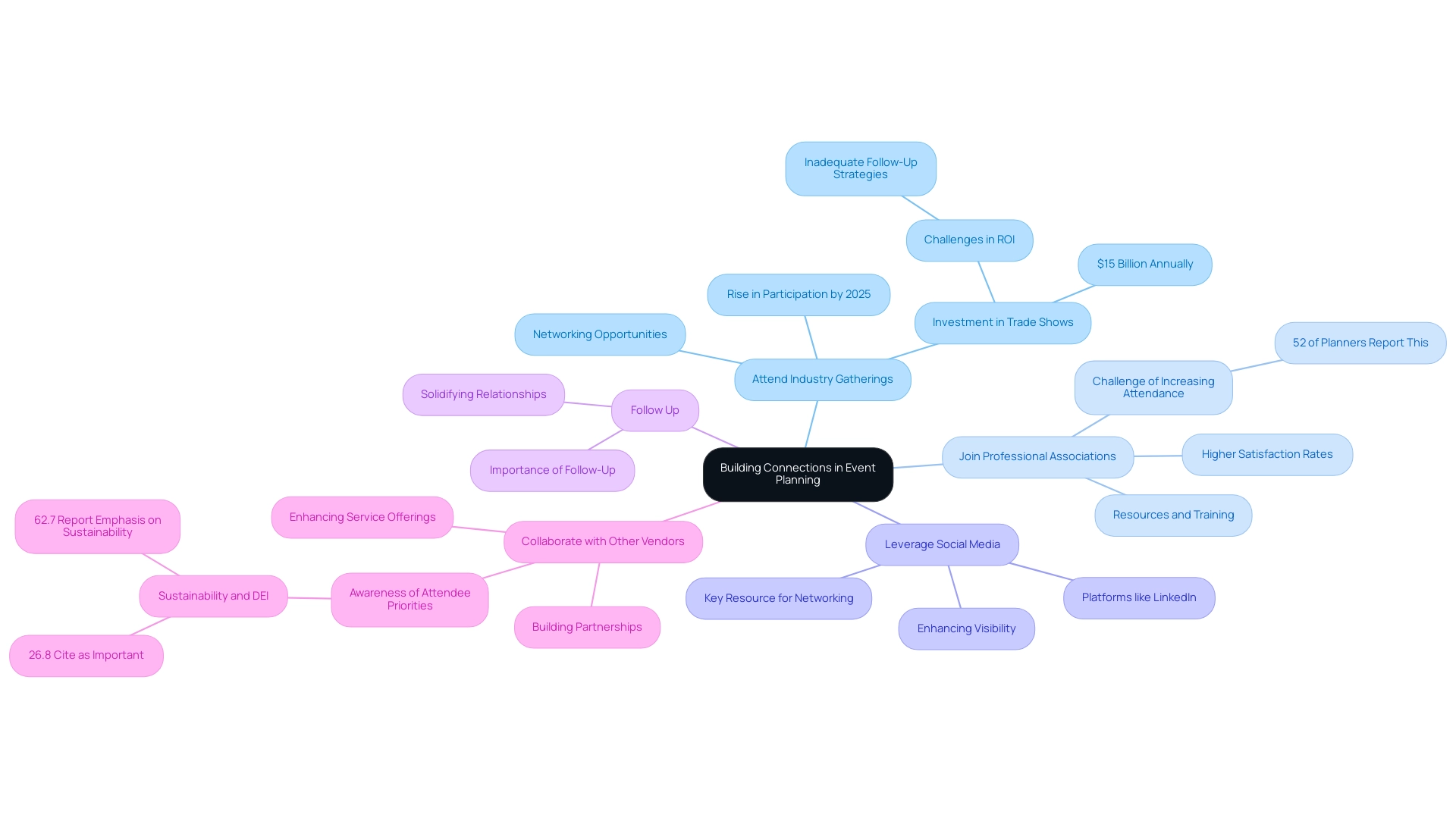
Navigating Challenges: Overcoming Common Hurdles in Event Planning
-
Anticipate Common Issues: We understand that in the dynamic landscape of planning, identifying potential challenges like budget overruns, vendor discrepancies, or last-minute changes can feel overwhelming. Developing comprehensive contingency plans not only prepares you for these hurdles but also instills confidence in your clients. By taking a proactive approach, you can significantly mitigate risks and enhance the overall experience. Remember, you are not alone in facing these challenges.
-
Stay Organized: Effective organization is truly the backbone of successful planning. Have you ever felt lost in the chaos? Utilizing project management tools can streamline your workflow, keeping track of tasks, deadlines, and communications. Statistics indicate that 60% of organizers consider applications essential for enhancing engagement and driving results. These tools minimize confusion and errors, ensuring every detail is accounted for. As the industry evolves, understanding consumer preferences for personalized and engaging experiences is essential for your success.
-
Open lines of communication with customers and vendors are vital for addressing concerns promptly. Regular updates and check-ins can prevent misunderstandings and ensure that everyone aligns with the vision of the occasion. This collaborative approach fosters trust and transparency, which are crucial for successful partnerships. Remember, as David Ogilvy famously said, “The customer is not a moron. She is your wife.” Comprehending your clients’ requirements is essential in organizing, and we are here to help you navigate this journey.
-
Seek Support: The event planning business flourishes through cooperation, and you don’t have to face challenges alone. Don’t hesitate to reach out to mentors or industry peers when you encounter obstacles. Their insights can lead to innovative solutions and provide you with fresh perspectives. Establishing a network of support can be invaluable as you navigate the complexities of your event planning business. As we head into 2025, leveraging these connections can open new career opportunities for you.
-
Learn from Experience: Ongoing enhancement is essential for achievement in organizing activities. After each occurrence, conduct a thorough debrief to evaluate what went well and identify areas for improvement. This reflective practice not only enhances your skills but also contributes to the evolution of your planning strategies, ensuring that each event is better than the last. Embracing this mindset will position you favorably in a promising and expanding industry, reminding you that every experience is a stepping stone toward your success.
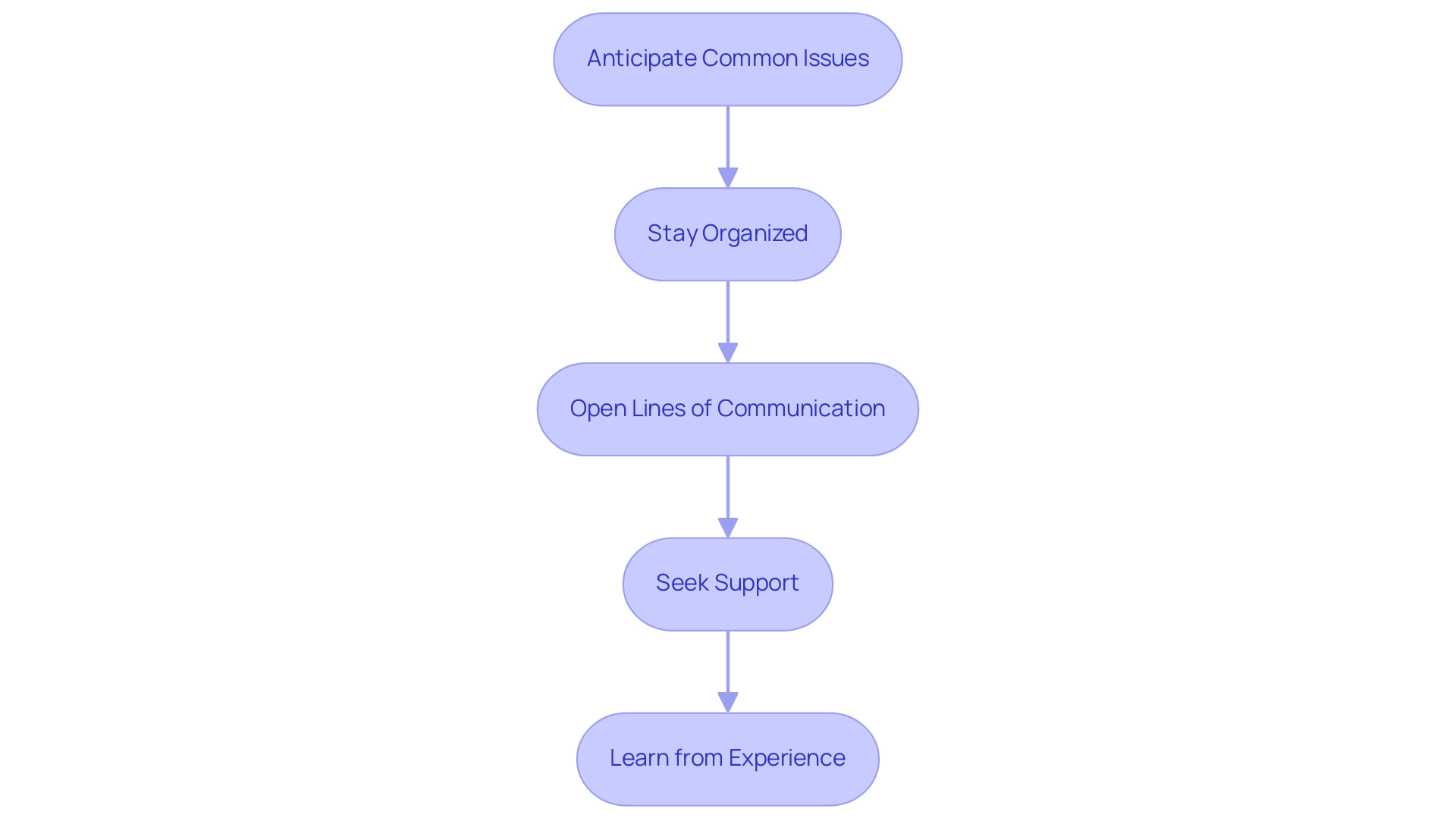
Conclusion
Establishing a successful event planning business can feel overwhelming, but remember, you are not alone in this journey. Each step you take is vital for laying a strong foundation. By conducting thorough market research and defining a unique business structure, you are setting the stage for future success. Identifying your niche and understanding market demand are essential; they allow you to tailor your services to meet specific needs while fostering community engagement.
Marketing strategies are crucial in attracting clients and building a reputable brand. Have you considered utilizing social media, networking with industry professionals, or showcasing testimonials? These actions can significantly boost your visibility and credibility. Moreover, a well-structured financial plan and effective budgeting are vital for maintaining profitability and managing startup costs, ensuring you can focus on what you love.
The path to becoming a successful event planner is filled with challenges, but with proactive planning, effective communication, and a commitment to continuous improvement, you can navigate these hurdles. Embracing collaboration and leveraging industry connections will empower you to create memorable events that resonate with your audiences, foster community involvement, and turn your passion into a thriving career.
In conclusion, the event planning industry is brimming with opportunities for those willing to invest time and effort into understanding the landscape. With a focus on strategic planning and adaptability, the journey from concept to execution can transform not only your career but also the experiences of countless attendees. Now is the time to take the first steps and embark on this rewarding path to career ownership. Remember, every great journey begins with a single step, and you have the power to make it happen.


